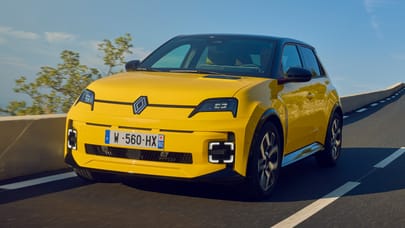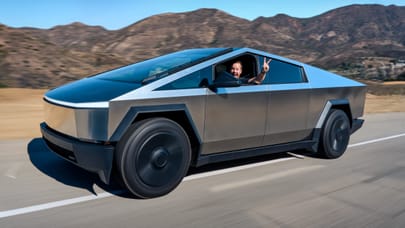
SPEC HIGHLIGHTS
- BHP
258bhp
- 0-62
7.7s
- CO2
189g/km
- Max Speed
130Mph
- Insurance
group42E
What’s the story with the new Land Rover Discovery?
The new Disco – the fifth generation – builds on Land Rover’s manifesto that posits this as the world’s most useful family car. A generation ago, that would have been a Cortina Estate, and you certainly wouldn’t get one of those up the rutted track – somewhere deep in the Scottish Highlands – that we’re making our way up right now.
Tech highlights?
The new Disco’s body is 85 per cent aluminium, which cuts 480kg off the base car’s weight (it’s now 2,115kg unladen), and the entire body-side is a single pressing to improve rigidity while being less complex to manufacture. There’s another single-piece pressing for the floor, the dash structure is magnesium, and lightweight steel is used on the front and rear sub-frames. The air suspension features a double wishbone layout at the front, and an integral multi-link rear to contain roll without hurting the ride, while preserving the impact resistance an SUV needs.
We can only assume that all this translates rather successfully to the road.
We’ll have to assume a little longer. For this late-prototype drive, we were restricted to off-road activities only. But there certainly can’t be many more civilised ways of demolishing a wilderness than this. Not once in two hours of mud, rocks, and slime do we hear any expensive-sounding scraping noises, or come even vaguely close to getting stuck.
OK. But, apart from adopting aluminium, what else has changed?
This is the most revolutionised Disco since the original back in ’89. For a product whose core values revolve around robustness and versatility, the Disco 5 is something of a slave to software. There are 71 separate ECUs, and so much code zooming about that it’s known as the ‘digital Discovery’. A good proportion of those govern the car’s Terrain Response 2, which automatically monitors and optimises throttle, steering and traction, while the All-Terrain Progress Control (ATPC) is effectively an off-road cruise control. It’s clever, no doubt about it, but like all these things requires a leap of faith, especially on a near vertical drop. Land Rovers have had a form of hill-descent control for years, but they’re really pushing the boundaries now. Ground clearance (283mm) and wheel articulation (500mm) sees us manage a perilous rock crawl with zero bother. ATPC is pretty much a precursor and answer to a question I’m not sure anyone’s asked: when can I buy a fully autonomous off-roader?
Are you saying this is the off-roader for people who haven’t got a clue how to drive off-road? Isn’t conquering a wilderness as part of a man/machine combo one of the main thrills of the whole exercise?
You sound like those two berks off The Fast Show. "We wanted to create a vehicle that was as easy for as many people as possible to use," chief product engineer Alex Heslop insists. A two-speed transfer box with selectable high and low range gears is available as an option, for anyone who needs to go further, including up rivers or through floods. The new Disco can wade in water up to 900mm, thanks to a ‘labyrinth intake’ system that basically means the engine can breathe underwater. "It could go deeper," Heslop tells me, "but above that figure you lose traction at the rear, and the car begins to float. And you need to open the rear doors to combat that, which isn’t ideal." We tried it – wading, not opening the doors – and it’s unnervingly good. Short of buying one of those tricked out Landcruisers favoured by apocalyptic survivalist loonies, it’s difficult to see what could get you out of trouble more effectively than one of these.
Top Gear
Newsletter
Thank you for subscribing to our newsletter. Look out for your regular round-up of news, reviews and offers in your inbox.
Get all the latest news, reviews and exclusives, direct to your inbox.
What if you – whisper it – never venture off-road?
What, like 90 per cent of the people who own Discoverys (Discoveries)? The new one is unbelievably focused. There’s room inside for seven, rugby-playing, full-size adults, all of whom can have heated seats. LR is also pioneering Intelligent Seat Fold in this car, via the main touchscreen, switches in the luggage area near the C-pillar, or by using a smartphone app. With row three folded, there’s 1,231 litres of stowage space; fold row two and it’s as big as a branch of Ikea. Between the giant door-bins, glove-box and under-floor areas, there’s 172 litres of storage, and four iPads or a pair of two litre water bottles can fit in the centre console. Up to four 12V sockets and nine USB charging points can be specified, and in-car 4G WiFi can support up to eight devices.
That’s a modern family car, right there. What else?
The driver and passenger get JLR’s InControl Touch Pro multimedia set-up that includes a 10in touchscreen, dual view, sat-nav with a new ‘commute mode’, and all sorts of other displays and graphics. It’s not the nicest looking system, and Audi, BMW and Mercedes are all ahead of the curve on this stuff, but it works.
What about the old-fashioned hardware bits?
We switched between the (255bhp) 3.0-litre TDV6 (335bhp, 39.2mpg, 189 CO2s) and 3.0-litre Si6 petrol, both of which felt smooth and unobtrusive, at least at the speeds we were limited to as we took the long way round. There’s no doubt that the new Disco has been created with a class-leading focus on the things that active families actually need. The new car also gets JLR’s Ingenium 2.0-litre turbodiesel, which produces 237bhp and has a claimed average of 43.5mpg and coughs out 171 CO2s. Imagine a 2.0-litre hauling an old Disco.
Any issues?
Only subjective ones. Although we rate the outgoing car as one of the great pieces of automotive design – of product design, in fact – LR insists that it polarised too many potential customers. Maybe that’s why the new one looks rather generic. Honestly, if you covered the badges, would you recognise it as a Land Rover? And we’re not sure about the offset rear number-plate, while we’re grumbling. Secondly, although there were rubber floor mats in our test car, the Disco is definitely a premium proposition. "It might not look or feel it, but trust me – the new car is more rugged and capable than the old one," Alex Heslop insists. Prices start at £43,495, but our main ride was an optioned-up TDV6 in HSE Luxury spec, costing a hefty £69,415. As we stare down the barrel of yet more austerity, it’s tempting to wonder how many ordinary families will be able to stretch to a decently specced new Disco. But if I was the owner of a Scottish estate, I’d have one in a heartbeat.








